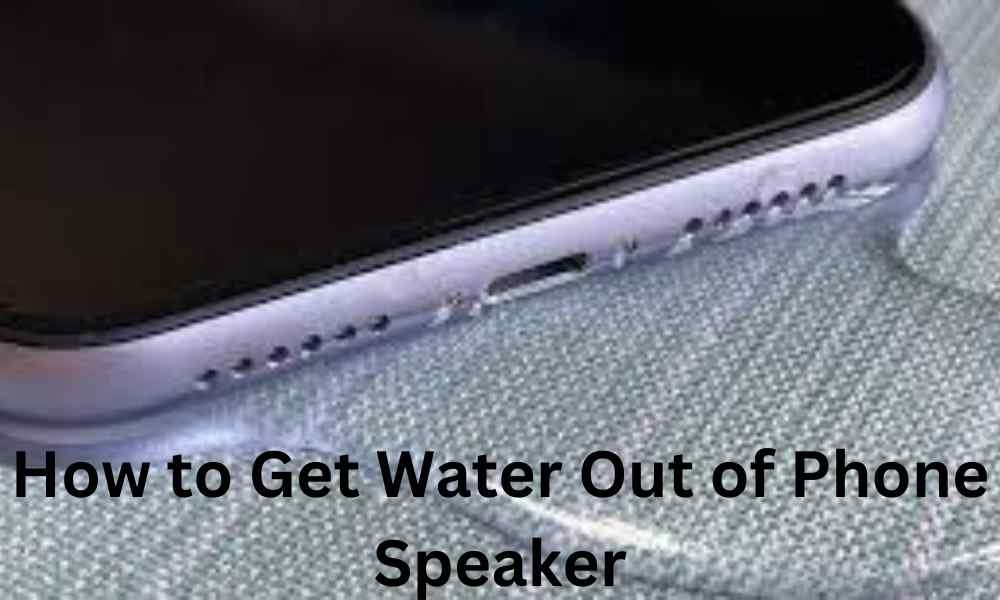Ever accidentally dropped your phone in water or got it splashed on during a rainy day? Removing Water Out of Phone Speaker becomes crucial in such situations.
If so, you might have experienced the dreaded moment when water seeps into your phone’s speaker. Keeping your phone’s speaker dry is crucial for maintaining its functionality. Water in the speaker, especially if you’re wondering “How to Get Water Out of Phone Speaker” can lead to muffled sound, permanent damage, or even complete malfunction. Let’s dive into how you can rescue your phone speaker from water damage and ensure it stays in top-notch condition.
Are you looking for Phone Repair in Houston?
Understanding the Problem
How Water Gets into Phone Speakers
Phones are exposed to water in various ways, from spills and splashes to complete submersion. The speaker grills, being small and numerous, can easily allow water to seep in, especially if your phone lacks proper waterproofing.
Immediate Effects of Water in Cell Phone Speakers
Once water enters the speaker, it can cause immediate sound distortion. You might hear a muffled or crackling sound instead of the clear audio you’re used to. In some cases, the speaker might stop working altogether until the water is removed.
Precautionary Measures
Waterproof Phone Cases
One of the best ways to protect your phone speaker from water damage is by using a waterproof case. These cases provide a seal that prevents water from entering the phone’s vulnerable spots.
Avoiding Water Exposure
Simple habits can make a big difference. Avoid using your phone near pools, in the rain, or in other wet environments unless it’s protected. If your phone is not water-resistant, being cautious is your best bet.
Immediate Actions to Take
Turn Off the Phone
As soon as your phone gets wet, turn it off immediately. This helps prevent any electrical short circuits that could damage internal components.
Remove Phone Case and Accessories
Take off any case, SIM card, and other accessories to allow better air circulation and facilitate the drying process.
How to Get Water out of Phone Speaker without Rice
To remove water from a phone speaker without rice, gently shake the phone to dislodge any trapped water. Use a soft cloth to dab away moisture from the speaker grill. Alternatively, use a vacuum cleaner on a low setting to suction out the water, ensuring the phone is powered off throughout the process.
Drying Techniques to Remove water from phone speaker
Using a Soft Cloth
Start by gently wiping the phone with a soft, absorbent cloth. This removes excess water from the surface and prevents it from seeping deeper into the device.
Gravity Method: Shaking and Tilting
Hold your phone with the speaker facing down and gently shake it to encourage water to drip out. Tilting the phone at various angles can also help.
Utilizing Absorbent Materials
Place your phone in a bowl of uncooked rice or silica gel packets. These materials are excellent at absorbing moisture and can help draw out the water from the speaker.
Suck the Water Out of Phone Speaker
If your phone speaker gets wet, gently suck the water out using a vacuum cleaner or a straw. Be careful to avoid damaging the speaker. This method helps remove moisture, preventing damage and restoring sound quality. Always make sure your phone is powered off before attempting this.
Advanced Drying Methods to Remove water from phone speaker
Vacuum Cleaner Method
Using a vacuum cleaner with a small nozzle, gently suck out the water from the speaker grill. Be cautious not to hold the vacuum too close to avoid damaging the phone.
Hairdryer (Cool Setting) Method
Set your hairdryer to a cool setting and blow air towards the speaker. Avoid using heat, as it can damage the phone’s components.
Desiccant Packs
Place your phone in a sealed bag with desiccant packs (those little packets you find in shoe boxes). Desiccants are highly effective at absorbing moisture.
Using Technology for Help
Apps That Emit Sound Waves to Expel Water
There are apps designed to emit specific sound frequencies that help push water out of the speaker. These apps create vibrations that can expel trapped water.
YouTube Videos Designed for Water Expulsion
Some YouTube videos feature sound waves similar to the apps mentioned above. Playing these videos at full volume can help remove water from your speaker.
Things to avoid when phone speaker gets wet
Things to avoid when phone speaker gets wet:
- Avoid Immediate Use After Water Exposure
- Do Not Blow Air Into the Speaker
- Steer Clear of Heat Sources like Hair Dryers
- Refrain from Shaking or Tapping the Phone
- Seek Professional Assistance if Necessary
Avoiding Common Mistakes
Avoiding Heat Sources
Never use an oven, microwave, or direct sunlight to dry your phone. Excessive heat can warp or damage the phone’s internal components.
Not Using Compressed Air
Compressed air can push water further into the phone rather than expelling it. Stick to gentler methods like the ones mentioned above.
Not Charging the Phone While Wet
Charging a wet phone can cause serious damage. Ensure the phone is completely dry before plugging it in.
Post-Drying Steps
Checking for Remaining Moisture
After you’ve tried drying your phone, let it sit in a dry, well-ventilated area for at least 24 hours. This ensures any remaining moisture has time to evaporate.
Testing Speaker Functionality
Once you believe the phone is dry, turn it on and test the speaker. Play some audio to check for clarity and volume. If the sound is still muffled, repeat the drying process.
When to Seek Professional Help
Recognizing Signs of Severe Damage
If your phone’s speaker remains non-functional after thorough drying, or if other issues arise (like screen problems or system errors), it’s time to seek professional help.
Finding a Reliable Repair Service
Look for authorized repair centers or reputable local technicians. They can disassemble your phone and dry out or replace the speaker if necessary.
Preventative Measures for the Future
Investing in Waterproof Phones
Consider upgrading to a phone with a higher water-resistance rating. Many modern phones are designed to withstand brief submersion and splashes.
Using Waterproof Accessories
In addition to a waterproof case, consider using other waterproof accessories, like pouches or bags, especially when you’re around water.
Risks of not removing water from a phone speaker
Failing to remove water from a phone speaker can lead to serious risks. Water left inside can corrode internal components, potentially causing short circuits and permanent damage. It may also diminish speaker performance, affecting sound quality. Additionally, stagnant water increases the risk of mold growth, posing health concerns and further compromising device functionality. Swift action to dry out the speaker is crucial to prevent these issues and maintain your phone’s longevity.
Conclusion
Water in your phone’s speaker can be a frustrating problem, but with the right steps, you can often resolve it at home. From immediate actions to advanced drying methods, ensuring your phone is dry is crucial to restoring its functionality. Remember to take preventive measures to protect your device in the future. If all else fails, don’t hesitate to seek professional help. By being proactive and cautious, you can keep your phone in great shape and avoid the pitfalls of water damage.
Frequently Asked Questions
How can I tell if there’s water in my phone speaker?
If your phone speaker sounds muffled, distorted, or if you hear crackling noises, there’s a good chance water has entered the speaker.
Is it safe to use a hairdryer on my phone?
Yes, but only on a cool setting. Avoid using heat as it can damage your phone’s internal components.
Can I use rice to dry my phone speaker?
Yes, placing your phone in a bowl of uncooked rice can help absorb moisture from the speaker and other parts of the phone.
How long should I wait before turning my phone back on?
Wait at least 24 hours after attempting to dry your phone before turning it back on to ensure all moisture has evaporated.
What should I do if my phone speaker is still not working after drying?
If your speaker remains non-functional, seek professional repair services. Persistent issues may indicate more severe water damage requiring expert attention.



